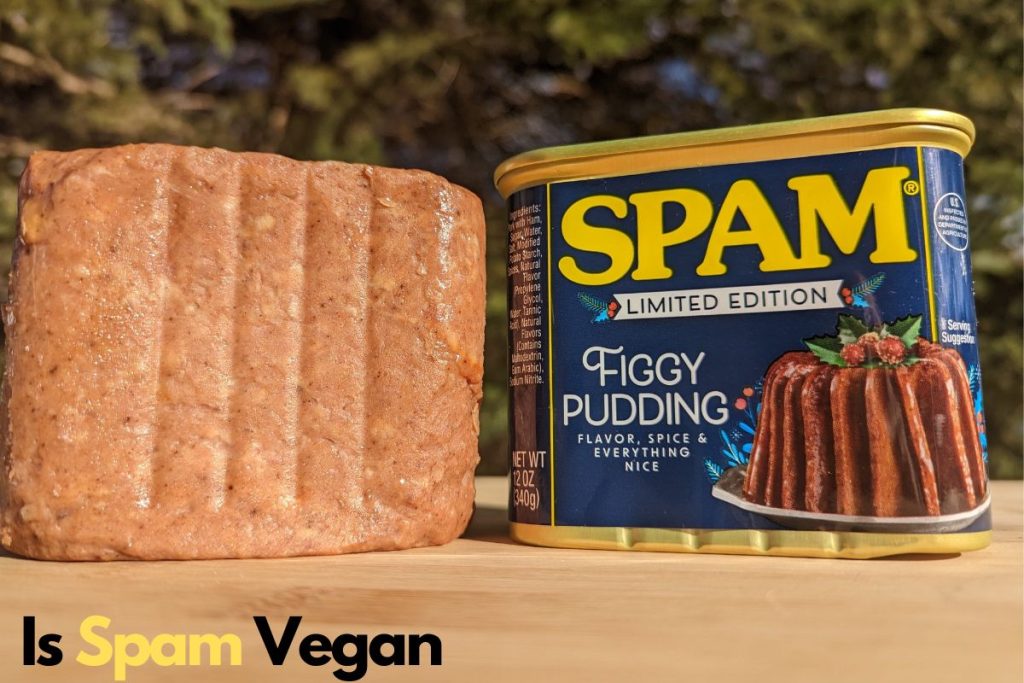Trying to figure out whether the canned cooked meat Spam is vegan friendly can be difficult.
As manufacturers ofen mask the actual ingredients behind vague terms, and even when they do give you a full list, they never include how those ingredients were made.
To make sure that you are only consuming food that aligns with your vegan lifestyle and diet, I’ve investigated the ingredients and production processes of Spam.
And here’s what I found: Spam is not considered vegan, as it is real meat made from pork.
While Spam is a favorite among many, its vegan status is clear. This is due to the ingredients used in Spam, which are derived from animals.
In this article, we’ll dive into the ingredients of Spam, explore why it is not vegan, and provide vegan-friendly alternatives.
What is Spam?

Spam is a brand of canned cooked meat that’s been around since 1937. It was developed by Hormel Foods Corporation and has become a staple in many households around the world.
Spam is known for its long shelf life, making it a convenient option for those who need a quick and easy source of protein.
Spam can be used in a variety of dishes, from sandwiches and burgers to fried rice and stews.
Its unique flavor and texture make it a versatile ingredient that can be used in both simple and gourmet recipes.
Ingredients in Spam
So, what goes into each can of Spam? The ingredients are quite simple.
Most varieties of Spam contain the following:
- Pork with Ham: This is the primary ingredient in Spam. It’s what gives Spam its meaty flavor and texture.
- Salt: This is used to enhance the flavor of the Spam and also acts as a preservative.
- Water: This is used in the cooking process and also contributes to the texture of the Spam.
- Modified Potato Starch: This acts as a binder, helping to hold the meat together.
- Sugar: This is used to enhance the flavor of the Spam.
- Sodium Nitrite: This acts as a preservative, helping to extend the shelf life of the Spam.
Is Spam Vegan?
The primary ingredient in Spam is pork with ham, which is clearly not vegan.
Veganism excludes all forms of animal exploitation and cruelty, and this includes the consumption of meat and any products derived from animals.
Why Spam Is Not Vegan
Given the inclusion of pork and ham, traditional Spam is not considered vegan. This is a common issue with many types of canned meats, as they are made from animal-derived ingredients.
While there are plant-based alternatives to meat, these are not used in traditional Spam.
Therefore, if you're following a vegan diet, it's best to avoid Spam and look for vegan-friendly alternatives.
In the next section, we’ll explore vegan-friendly alternatives to Spam and provide tips on what to look for when choosing vegan meat alternatives.
Vegan-Friendly Meat Alternatives to Spam
While traditional Spam is not vegan, there are several brands on the market that offer vegan-friendly meat alternatives.
These brands often use plant-based ingredients and avoid using any animal-derived products.
Here are some popular vegan meat alternative to spam and where to buy them:
Tofurky: This brand offers a variety of vegan meat alternatives, including deli slices and sausages. They use ingredients like tofu and wheat protein to mimic the texture of meat.
You can buy it here.
Beyond Meat: Beyond Meat offers a range of vegan meat alternatives, including burgers and sausages. They use pea protein and other plant-based ingredients to create products that look, cook, and taste like meat.
You can buy it here.
Gardein: Gardein offers a wide range of vegan meat alternatives, from chicken tenders to fishless filets. They use a blend of wheat, soy, and pea proteins to create their products.
When looking for a vegan meat alternative, there are a few key things to keep in mind:
Check the Ingredients: Look for any potentially non-vegan ingredients, such as egg or dairy products.
Look for Certifications: Some products will have vegan certifications, which can provide assurance that the product is vegan-friendly.
Final Thoughts: Spam Is Not Vegan
The primary ingredient of Spam is pork with ham, which clearly does not align with a vegan lifestyle.
However, this doesn’t mean that those following a vegan lifestyle need to miss out on convenient, protein-rich foods.
With a growing number of brands offering vegan-friendly meat alternatives, it’s easier than ever to find a product that aligns with vegan principles.
Whether you’re vegan or not, understanding the ingredients in products like Spam can help us make more informed choices. So, the next time you reach for a canned meat product, you’ll not only appreciate its convenience and versatility but also the considerations behind its ingredients.
